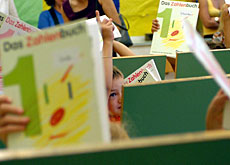Swiss struggle for harmony in the classroom

When it comes to education in Switzerland the canton is king, which means there are 26 different school curricula.
However, efforts are being made to harmonise the Swiss education system in a way that will nevertheless respect the individual character of each canton.
The Federal Constitution lays down the right to education and the obligation to attend school, but it is the cantons that are responsible for schooling.
That is why each canton takes its own independent decisions on the structure of its education system, what syllabuses and teaching resources to adopt, when to begin the school year, and the dates of school holidays.
Whereas pupils in canton Bern went back to school on August 11, the new school year for children in canton of Ticino doesn’t begin until September 11.
Equally, it is agreed that children will begin school at the age of six. However, not all the cantons interpret this rule in the same way.
In Graubünden, for example, children must have turned six by December 31 of the year before they start school; in Geneva, their sixth birthday must fall before October 31 of the year in which they actually begin school.
Room for dialogue
However, this does not mean that each canton does its own thing without regard for the others. To ensure contact and harmony between the different education systems, the cantons set up the Swiss Conference of Cantonal Directors of Public Education (CDPE) in 1897.
In 1970 the efforts of the CDPE gave rise to an “educational concordat”. Signed by all the cantons, this agreement lays down a framework for both primary and secondary education (middle school).
“There are differences between the different cantonal systems, but many of them are unimportant,” explains Gabriela Fuchs, communications officer with the CDPE.
“In my opinion, whether school begins a week earlier or a week later is not a problem, even for families moving from one canton to another. What is important is the knowledge and skills the pupils acquire.”
Pupil mobility
To remove obstacles to pupil mobility, the CDPE has launched a project to “harmonise compulsory schooling”, which should be completed in 2006.
“The objective is not so much to harmonise structures or have a direct impact on school syllabuses as to establish what a child should know at the end of the second, sixth and ninth years of schooling, particularly in languages, mathematics and natural sciences,” explains Fuchs.
The project also lays down assessment procedures for measuring, on a national basis, the extent to which pupils have acquired the necessary skills. The cantons retain the freedom to decide how best to teach the skills in question.
But a standardised Swiss education system still seems far off.
“Let us not forget that we are a multilingual, multicultural country,” points out Fuchs.
Harmonisation process
Nevertheless, at least in each language region, the harmonisation process seems to be gathering pace. The French-speaking cantons have established PECARO, a framework programme for the whole region.
In so doing, they are responding to the practical concerns of the local population. In a recent survey conducted by the French-language radio station, Radio Suisse Romande (RSR), 67.5 per cent of those questioned said they would like to see greater harmonisation of the school curriculum in the French-speaking cantons.
But there is no desire to override the individuality of each canton.
“The school system reflects society and is possibly the environment in which the specific culture of a region is most strongly expressed,” said Isabelle Chassot, head of the education in canton Fribourg, in a recent radio interview.
“Education in Geneva will never be exactly the same as that provided in Fribourg, and maybe it’s a good thing that this difference is made plain.”
swissinfo, Doris Lucini (translation: John Purnell)
Age at start of compulsory schooling: 6 years
Minimum duration of school attendance: 9 years
Start of school year: August or September
Minimum duration of school year: 38 weeks
Duration of study to obtain the school-leaving diploma (Matura): 12-13 years.

In compliance with the JTI standards
More: SWI swissinfo.ch certified by the Journalism Trust Initiative

You can find an overview of ongoing debates with our journalists here . Please join us!
If you want to start a conversation about a topic raised in this article or want to report factual errors, email us at english@swissinfo.ch.